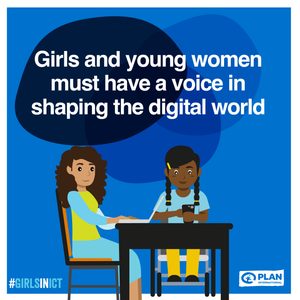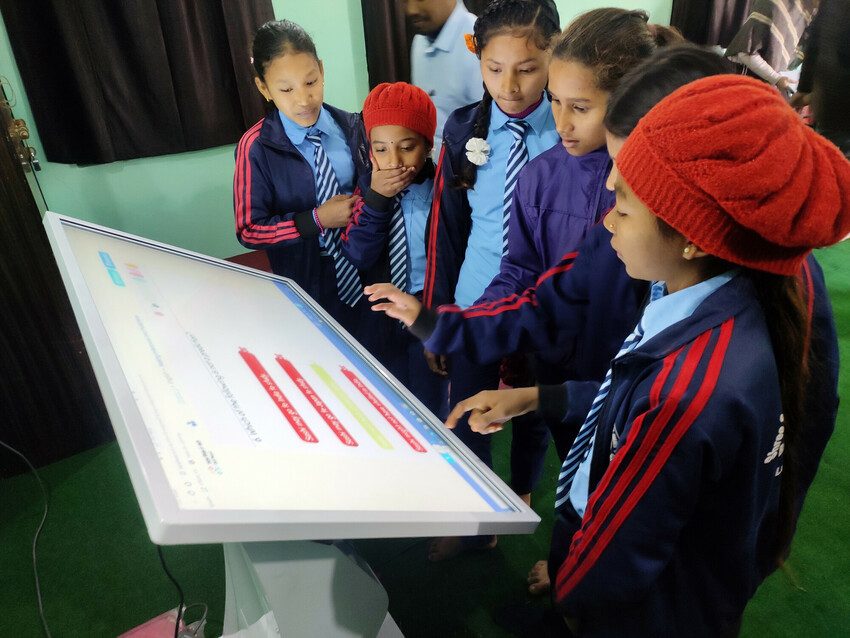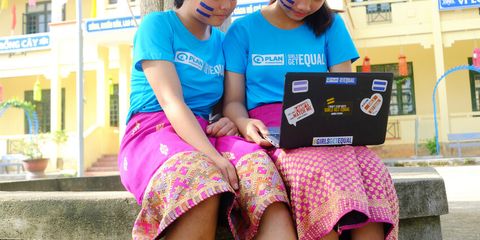Girls must be digital leaders!
27 April 2023Girls are taking opportunities to become digital creators and learn skills that will allow them to flourish this Girls in ICT Day, write Julia Spencer and Nikita Shrubsole.
Bridging the digital gender divide

The gender divide in digital access, digital literacy, and ICT education and occupations hinders young women and adolescent girls’ access to the benefits and opportunities that digital technologies offer. Over 90% of jobs worldwide already have a digital component and most jobs will soon require sophisticated digital skills.
Discrimination experienced in early education systems reinforces stereotypes of what is appropriate for boys and girls to learn and acts as a barrier for girls from studying and working in non-traditional fields such as STEM (Science, Technology, Engineering and Maths).
As adolescents, their access to technology and the internet increases but they are less equipped to navigate online spaces safely and benefit from the many educational, social, economic, and health resources that digital spaces and technologies offer. Girls know this and recognise how important it is for them to obtain digital skills.
Building on the promises of CSW

Today’s Girls in ICT day falls one month after the 67th session of the Commission of Status of Women (CSW), the theme of which: innovation, technological change and education sought solutions to achieve gender equality and the empowerment of all women and girls in the digital age. The agreed conclusions will guide action by governments, the UN system, civil society, the private sector, and other stakeholders
The Commission expressed concern about the under-representation of women and girls, and their limited participation in the conceptualisation, development, implementation and use of digital technologies. It called for the full, equal and meaningful participation and leadership of young women and adolescent girls, in decision-making processes, the inclusion of women and girls in innovation teams, and to increase the digital, data and media literacy and skills of all women and girls.
Challenges for adolescent girls were also addressed:
“Adolescent girls are part of the most digitally connected generation in history, and can disproportionately face discrimination, violence that occurs through or is amplified by the use of technology, and other barriers in the context of innovation and technological change, and education in the digital age, which prevents them from accessing the full benefits of digital technologies and meaningful participation in society, and can create and exacerbate inequalities.” (Article 19)
In addition, the mention of “girls” was up 57% from last year’s Agreed Conclusions.
While this is promising, the ultimate success of the agreed conclusions lies in how they are taken forward.
“My experience as a young girl from Ghana participating in the 67th session of CSW was incredibly valuable and allowed me to gain a deeper understanding of the critical role that technology and innovation can play in achieving gender equality in education.
“I hope that my recommendations can help to ensure that future events are more inclusive and provide young people with the opportunity to engage in meaningful discussions and provide their perspectives.”
– Hiqmat, CSW Youth Delegate
Girls in ICT Day 2023: Digital Skills for Life
This year’s Girls in ICT Day allows us an opportunity to take action and call for girls and adolescent girls to be equipped with the digital skills for their full, equal and meaningful participation and leadership in the conceptualisation, development, implementation and use of digital technologies and engage in decision-making processes concerning the digital environment.
Women’s underrepresentation in the tech sector is well known and young women and adolescent girls’ contributions and leadership go largely unrecognised. This year’s Girls in ICT Day addresses these gaps head-on, bringing girls to the centre of technology and empowering them with digital skills for life.
In our recently launched podcast series, the Girls Tech Show, girls from across the globe are having peer-to-peer conversations, discussing why girls need digital skills, the importance of creating inclusive and safe online spaces, and ensuring girls are leaders and designers of technology.
“I was involved in a tech program for girls, where we got to learn how to code, make games, and program, which was amazing because it showed us that girls could also code and do things that usually boys get to do.”
Eliana, Sweden, Solve for Tomorrow runner-up, Equality Tech participant, Girls Tech Show Host
How we’re celebrating Girls in ICT Day Across Plan International
In Bangladesh, Nepal and Laos
Starting on Girls in ICT Day, girls will be enrolled in formal programs with a focus area of their choice including basic coding, graphic design, and web development, and after the completion of the course, the girls will receive an opportunity to complete an internship with a company to refine and apply their skills in a practical setting.
In partnership with local high schools and local government departments, girls are invited to take part in digital skills-building workshops and participate in discussions between girls and women leaders of companies in the tech sector. The discussion topics will include the importance of ICT, career opportunities, challenges faced by women in these sectors, and why we must fight for more gender equality.

In Sierra Leone, Liberia, Ghana, Togo, Nigeria, Cameroon, Malawi and Ethiopia
Throughout March, learning events were hosted on basic coding and robotics for girls in partnership with local secondary schools. On Girls in ICT Day, the girls will showcase their knowledge from their learning events, take part in live panel discussions, and will have the opportunity to engage with women pioneering careers in STEM.
Girls will also be learning from their peers about the future of AI and how they can use the available technologies such as Chat GPT to enable them in their everyday work. They can also partner with professional women in the tech sector and start a mentorship program to learn more about breaking into a career in tech.
In Nicaragua and Ecuador
Together with local community organisers, girls between 12-15 years of age will take part in activities that foster creativity and digital design thinking while guiding the participants through an exercise to develop a business plan. The workshop will teach them how to incorporate digital strategies into their new ventures and future goals.
Also, girls will have the chance to take part in 3 workshops focusing on electronic circuit design, the fundamentals of Scratch, and robotics. After the workshops, the girls will engage in an interactive session, learning about the best practices and ways to ensure their safety online.
Working together for digital equality
Girls and women cannot be the only ones fighting for equal access to technology, digital education, and safe online spaces. Families, governments, civil society organisations, and the private sector must work to remove barriers inhibiting equality in STEM. It is also vital that men and boys recognise their privilege to pursue technology and digital education and work in partnership with girls and women to challenge gender barriers, discrimination, and social norms and promote fair and equitable opportunities.
Plan International strives to build a world in which girls have the tools and power to shape their own futures. We recognise the urgency of eliminating the digital gender gap. That’s why this year, countries throughout our global network are hosting a range of events from learning workshops, mentorship support, skill-building seminars, and career guidance. It’s not just that girls should have digital skills, but that they should be leaders of technology.
Julia Spencer is Communications and Knowledge Management Specialist, and Nikita Shrubsole is Digital Policy and Advocacy Lead at Plan International.

